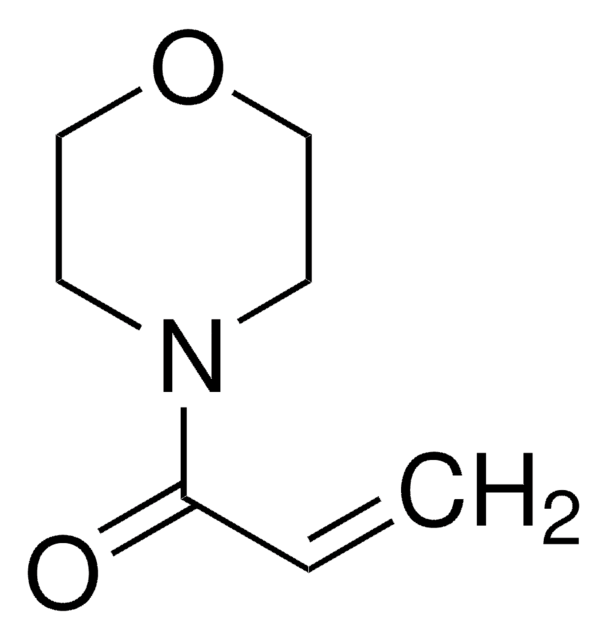655821
2-Acrylamido-2-methyl-1-propanesulfonic acid sodium salt solution
50 wt. % in H2O
Synonym(s):
2-Methyl-2-[(1-oxo-2-propenyl)amino]-1-propanesulfonic acid sodium, Sodium 2-acrylamido-2-methyl-1-propanesulfonate, Sodium acryloyldimethyltaurate
Sign Into View Organizational & Contract Pricing
All Photos(1)
About This Item
Linear Formula:
H2C=CHCONHC(CH3)2CH2SO3Na
CAS Number:
Molecular Weight:
229.23
MDL number:
UNSPSC Code:
12162002
PubChem Substance ID:
NACRES:
NA.23
Recommended Products
Quality Level
concentration
50 wt. % in H2O
refractive index
n20/D 1.4220 (lit.)
density
1.2055 g/mL at 25 °C (lit.)
SMILES string
[Na+].CC(C)(CS([O-])(=O)=O)NC(=O)C=C
InChI
1S/C7H13NO4S.Na/c1-4-6(9)8-7(2,3)5-13(10,11)12;/h4H,1,5H2,2-3H3,(H,8,9)(H,10,11,12);/q;+1/p-1
InChI key
FWFUWXVFYKCSQA-UHFFFAOYSA-M
General description
2-Acrylamido-2-methyl-1-propanesulfonic acid sodium salt (AMPS Na) is a monomer that belongs to the class of sulfonic acid monomers. It is commonly used in the production of various polymers, such as polyacrylamide co-polymers, poly(AMPS), AMPS-functionalized polymers, and hydrogels . These polymers are used in paints, adhesives, textiles, paper manufacturing, personal care products, coating, and adhesive applications. Additionally, AMPSNa also serves as a comonomer in combination with other acrylic monomers to enhance the scrub resistance and dispersant performance of paper coatings and paint emulsions. It can be used as a dopant and a protonating agent for conducting polymers. It is used in a variety of electronic applications.
Application
2-Acrylamido-2-methyl-1-propanesulfonic acid sodium salt (AMPS Na) can be used:
- As a monomer in the formation of polyelectrolyte copolymer gels for potential application in bioengineering, biomedicine, and water purification .
- In the fabrication of Schottky diodes, humidity sensors, and lithium-ion batteries.
- As a monomer in the synthesis of a hydrogel nanocomposite applicable as a potential adsorbent for dyes .
Storage Class Code
10 - Combustible liquids
WGK
WGK 1
Flash Point(F)
Not applicable
Flash Point(C)
Not applicable
Choose from one of the most recent versions:
Already Own This Product?
Find documentation for the products that you have recently purchased in the Document Library.
Customers Also Viewed
Polymeric absorbent for water sorption based on chemically crosslinked poly (acrylamide/2-acrylamido-2-methyl-1-propanesulfonic acid sodium salt) hydrogels
Uzum OB, et al.
Polymer Bull., 57(5), 703-712 (2006)
Aurora Mejia et al.
ACS omega, 4(6), 11119-11125 (2019-08-29)
High molar masses homopolymers of both acrylamide (AM) and 2-acrylamido-2-methylpropanesulfonate (AMPS) as well as poly(AM-stat-AMPS) exhibiting a large range copolymer composition has been obtained via the optimization of a purely adiabatic gel process. Monomer concentrations ranging from 2.0 to 3.47
Hongjie Wang et al.
Journal of environmental sciences (China), 21(11), 1473-1479 (2010-01-30)
A novel adsorbent (AMPS-silica) was synthesized by bounding AMPS (2-acrylamido-2-methylpropanesulfonic acid) onto silica surface, which functioned with y-methacryloxypropyltrimethoxysilane reagent. The adsorbent was characterized by nitrogen adsorption/desorption measurement, thermogravimetric analysis (TGA) and potentiometric titration analysis. The TGA result indicated that the
Rakesh N Shinde et al.
Journal of hazardous materials, 233-234, 131-139 (2012-07-28)
Selective preconcentration of a target analyte in the solid phase is an effective route not only to enhance detection limit of the conventional analytical method but also for elimination of interfering matrix. An adsorptive membrane was developed for selective preconcentration
Fabrication of Schottky diode based on Zn electrode and polyaniline doped with 2-acrylamido-2-methyl-1-propanesulfonic acid sodium salt
Ebrahim SM
Journal of Polymer Research, 16(5), 481-487 (2009)
Our team of scientists has experience in all areas of research including Life Science, Material Science, Chemical Synthesis, Chromatography, Analytical and many others.
Contact Technical Service


![[2-(Methacryloyloxy)ethyl]dimethyl-(3-sulfopropyl)ammonium hydroxide 95%](/deepweb/assets/sigmaaldrich/product/structures/217/219/73c91e1c-0ee4-4b3d-bead-a6dc3d09d1da/640/73c91e1c-0ee4-4b3d-bead-a6dc3d09d1da.png)
![[2-(Methacryloyloxy)ethyl]trimethylammonium chloride solution 75 wt. % in H2O](/deepweb/assets/sigmaaldrich/product/structures/316/612/66b0f4cf-d060-427d-b4f5-e8fab3e5cffe/640/66b0f4cf-d060-427d-b4f5-e8fab3e5cffe.png)





![[3-(Methacryloylamino)propyl]trimethylammonium chloride solution 50 wt. % in H2O](/deepweb/assets/sigmaaldrich/product/structures/189/736/089bc8ae-2a98-416d-9f9a-a0a510b6b828/640/089bc8ae-2a98-416d-9f9a-a0a510b6b828.png)



